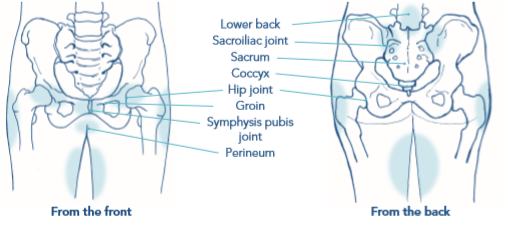Our services include:
- Information and advice after giving birth
- Advice and treatment following perineal trauma sustained during birth
- Assessment and treatment of musculoskeletal problems during pregnancy and after birth, such as pelvic girdle pain, carpal tunnel syndrome and abdominal diastasis
- Assessment and treatment of other problems related to pregnancy and birth such as incontinence and pelvic organ prolapse
Postnatal Information
In-patient Physiotherapy after having a baby
We have specialist Women’s Health Physiotherapy Assistants who work on our maternity wards at Doncaster and Bassetlaw hospitals. They are available on the wards Monday to Friday mornings. Their role is to provide information and advice to you following the delivery of your baby. You can ask them about any concerns you may have about symptoms of incontinence, prolapse, pelvic girdle pain, abdominal muscle weakness etc – they can give you specific advice and organise follow-up physiotherapy if this is needed.
If you don’t see a member of the physiotherapy team on the ward after having your baby, don’t worry – you can download all of the relevant information here.
Leaflets and Information
This leaflet provides general advice and information for after childbirth and contains the advice and exercises that the physiotherapy assistants go through on the wards.
The Pelvic, Obstetric and gynaecological Physiotherapy website has a lot more information about pregnancy and pelvic health in general – this information is also accessible in different languages and different formats.
Pelvic floor exercises after having a baby
Pelvic floor muscle exercises are very important after having a baby and can help to prevent problems both now and in the future, such as incontinence or pelvic organ prolapse.
This leaflet provides more information about pelvic floor exercises.
This video features a patient, physio and midwife, explaining how pelvic floor exercises can maintain muscle strength following pregnancy and birth.
The “NHS Squeezy” App is an award-winning App for smartphones and electronic devices. It was designed by chartered physiotherapists specialising in women’s and men’s health and is a very useful aid to help you remember your pelvic floor exercises. It is also a useful source of information and is available on Apple and Android devices and costs £2.99.
Perineal trauma during childbirth
Your perineum is the area between your vaginal opening and back passage (anus). It is common for the perineum to tear to some extent during childbirth. Tears can also occur inside the vagina or other parts of the vulva, including the labia.
Up to 9 in every 10 first time mothers who have a vaginal birth will experience some sort of tear, graze or episiotomy. It is slightly less common for mothers who have had a vaginal birth before. For most women, these tears are minor and heal quickly.
For some women (3 or 4 out of every 100) the tear may be deeper. Third or fourth degree tears, also known as obstetric anal sphincter injuries (OASI), extend into the muscle that controls the anus (anal sphincter). These deeper tears will be repaired (sutured) in an operating theatre.
Physiotherapy advice and support for perineal trauma
Our physiotherapy assistants on will see you on the postnatal wards and discuss with you your recovery after birth and advise you regarding exercises to help reduce the impact this will have on you long term.
If they do not see you on the ward, you will be referred by the ward staff, and you be will contacted via telephone within a few days of delivery.
Anyone who has a third or fourth degree tear will receive a telephone call at 6 weeks post birth to check whether there are any ongoing bladder, bowel or pain issues, and whether they are doing their pelvic floor exercises. If there are any problems, an appointment can be made with a specialist physiotherapist, for assessment and treatment as required
If you do not receive any information please call 01302 644207 and ask to speak to a member of the Women’s Health Physiotherapy Team and a member of staff will get back to you as soon as possible.
Further Information on perineal tears
The RCOG (Royal College of Obstetricians and Gynaecologists ) have developed a hub which aims to inform about the types of tears that can occur during childbirth, how to minimise your risk of deeper tearing, and what can be done to help your recovery if you do tear.
The Pelvic Obstetric and Gynaecological Physiotherapists website has general information about the postnatal period, including perineal healing, and also a number of leaflets about pelvic floor exercises, improving bowel function, Pilates, the role of physiotherapy etc.
The International Urogynaecological Association has various patient information leaflets (which are also available in some other languages). There is one specifically about maternal pelvic floor trauma.
Birth trauma resources

Light is a peer-support website with the following aims:
- To provide support to families who are affected by perinatal mental health illness
- To raise awareness of perinatal mental illness in Sheffield and beyond
- To promote partnership and an information network accessible to all
Masic has a wealth of information and support from a charitable organisation for women who have suffered severe perineal injuries during childbirth and aims to change the lives of those injured during childbirth.
The Birth Trauma Association is a useful website for parents (Mums & Dad’s) who have been traumatised by birth. They are a team of peer supporters: parents (one of whom is a dad) who have all experienced traumatic birth themselves and been through a process of recovery. The also have a Facebook group
Physiotherapy and pregnancy-related conditions
Please note if you have any concerns at all about your pregnancy please call midwifery Triage immediately on 01302 642711/642712
Physiotherapy can help during pregnancy with a variety of conditions including:
- Pelvic girdle pain
- Carpal Tunnel syndrome
- Diastasis Rectus (Tummy muscle separation)
- Bladder and bowel issues
- Pelvic organ prolapse
Pregnancy-related Pelvic Girdle Pain (PGP)
Some women develop pelvic pain in pregnancy. This is known as pregnancy-related pelvic girdle pain (PGP) and used to be called symphysis pubis dysfunction (SPD).
It is estimated that PGP affects up to 1 in 5 pregnant women to some degree.
PGP is not harmful to your baby and it does not mean that your pelvic is unstable or “out of place”, but it can be painful and make it hard to get around.
Most women with PGP can have a vaginal birth.
PGP may be felt:
- over the pubic bone at the front in the centre of the pelvis, roughly level with your hips
- across 1 or both sides of your lower back
- in the area between your vagina and anus (perineum)
- spreading to your thighs

Some may feel or hear a clicking or grinding in the pelvic area.
The pain can be worse when you’re:
- walking
- going up or down stairs
- standing on 1 leg (for example, when you’re getting dressed)
- turning over in bed
- moving your legs apart (for example, when you get out of a car)
Getting diagnosed as early as possible can help keep pain to a minimum and avoid long-term discomfort
PGP Classes:
We hold antenatal PGP classes at both Doncaster and Bassetlaw Hospitals. The aim of the class is to enable you to quickly access information and practical advice to help you manage your pain. At the start of the class you will have the chance for a brief 1:1 discussion about your symptoms, so that we can address any particular problems that you are experiencing within the class. If the physiotherapist thinks that you need a physical assessment then you will be invited to stay behind at the end of class, or to make a 1:1 appointment at a later date.
Please Note: The classes are a one-off session, and any further input needed is given on an individual basis. You will be given the contact details and advised what to do if your symptoms do not improve after the class.
If you feel unable to attend a class session for any reason, then let our reception team know, and you will be given a 1:1 appointment, which may be a telephone consultation, or a face to face appointment, and the same information will be given to you on 1:1 basis.
Doncaster Royal Infirmary classes:
Classes are held in the Physiotherapy department
Weekly class: Thursdays: 14.45-16.15
Extra class if needed (not every week) Mondays: 13.15-14.45
Bassetlaw District General Hospital classes:
Classes are held in the clinical therapy department
Fortnightly class: Fridays: 10.30-11.30
*Please note, classes are subject to change and available on a first come first served basis
How to book your appointment
To book an appointment, please ring physiotherapy on 01302 644207
PLEASE NOTE:
For a small number of women there will be a different cause for their pain which needs urgent medical attention. If you experience any of the following:
- Pain going down both legs at the same time
- Numbness in both legs at the same time
- Difficulty passing urine
- Leakage of stool from the bowel that you couldn’t control
- Numbness around the vagina or back passage
Call your GP straight away or go to your nearest A&E department.
Other Resources:
General pregnancy information

GetUbetter is a free app developed by clinical specialists and available to women across South Yorkshire and Bassetlaw
It provides information and advice for all stages of pregnancy. It also provides information on health prevention and a whole host of added features including:
- Information, guidance and advice
- Top tips for managing symptoms of pelvic health problems
- Pelvic floor exercise videos
- Regular surveys to monitor symptoms and progress
- Links to local support services.
General information from the NHS on all aspects of pregnancy
NHS advice about exercise in pregnancy
There is lots of information and a range of leaflets available on the Pelvic, Obstetric and Gynaecological Physiotherapists website (all of the information and leaflets can be translated into many languages and presented in different visual and verbal formats to make it more accessible). There are many leaflets available to download and print, including exercises and advice to help women cope with pregnancy and labour, pelvic floor exercises, exercises after childbirth, relaxation, preparation and fitness for pregnancy and birth etc.
The Royal College of Obstetricians and Gynaecologists has various leaflets about pregnancy, labour and delivery, including instrumental deliveries, shoulder dystocia etc.
Content out of date? Information wrong or not clear enough? Report this page.
